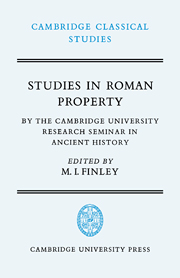Book contents
- Frontmatter
- Contents
- Preface
- 1 INTRODUCTION
- 2 SOME CONFIGURATIONS OF LANDHOLDING IN THE ROMAN EMPIRE
- 3 IMPERIAL ESTATES
- 4 CLASSICAL ROMAN LAW AND THE SALE OF LAND
- 5 THE CICERONIAN ARISTOCRACY AND ITS PROPERTIES
- 6 PRIVATE FARM TENANCY IN ITALY BEFORE DIOCLETIAN
- 7 URBAN PROPERTY INVESTMENT
- 8 AGRI DESERTI
- Notes
- Bibliography
- Index
- Frontmatter
- Contents
- Preface
- 1 INTRODUCTION
- 2 SOME CONFIGURATIONS OF LANDHOLDING IN THE ROMAN EMPIRE
- 3 IMPERIAL ESTATES
- 4 CLASSICAL ROMAN LAW AND THE SALE OF LAND
- 5 THE CICERONIAN ARISTOCRACY AND ITS PROPERTIES
- 6 PRIVATE FARM TENANCY IN ITALY BEFORE DIOCLETIAN
- 7 URBAN PROPERTY INVESTMENT
- 8 AGRI DESERTI
- Notes
- Bibliography
- Index
Summary
For two years our research seminar examined various aspects of Roman property. Some twenty people participated regularly and another ten or twelve attended when they could, not all from Cambridge. Several of the topics discussed are not properly, or not at all, represented in this volume: the more obvious absentees are land-values and methods of valuation (including sale by auction and the relationship between rents and prices) and the link between land and debt, generally as well as in the publicized crises of 49 B.C. and A.D. 33. The decision to publish or not was an individual one, depending solely on the author's personal judgement, whether because the investigation of a particular topic had been completed or because a survey of the current state of our information was a clear desideratum or because a neglected aspect of Roman property needed to be brought to the fore for further research.
Not only was every chapter discussed in the seminar but subsequent drafts were read and criticized by individual participants. This volume therefore represents common work (hence no thanks are expressed in the notes to members of the seminar) but not collective work. That is, no doctrines or agreed conclusions were imposed, or even sought, though there was fairly general agreement about the questions to be asked. As a result, though some disagreements were resolved, either in the seminar or in private discussion, others remain. Editorial intervention was restricted to the elimination of excessive duplication and overlapping.
- Type
- Chapter
- Information
- Studies in Roman PropertyBy the Cambridge University Research Seminar in Ancient History, pp. vii - viiiPublisher: Cambridge University PressPrint publication year: 1976

